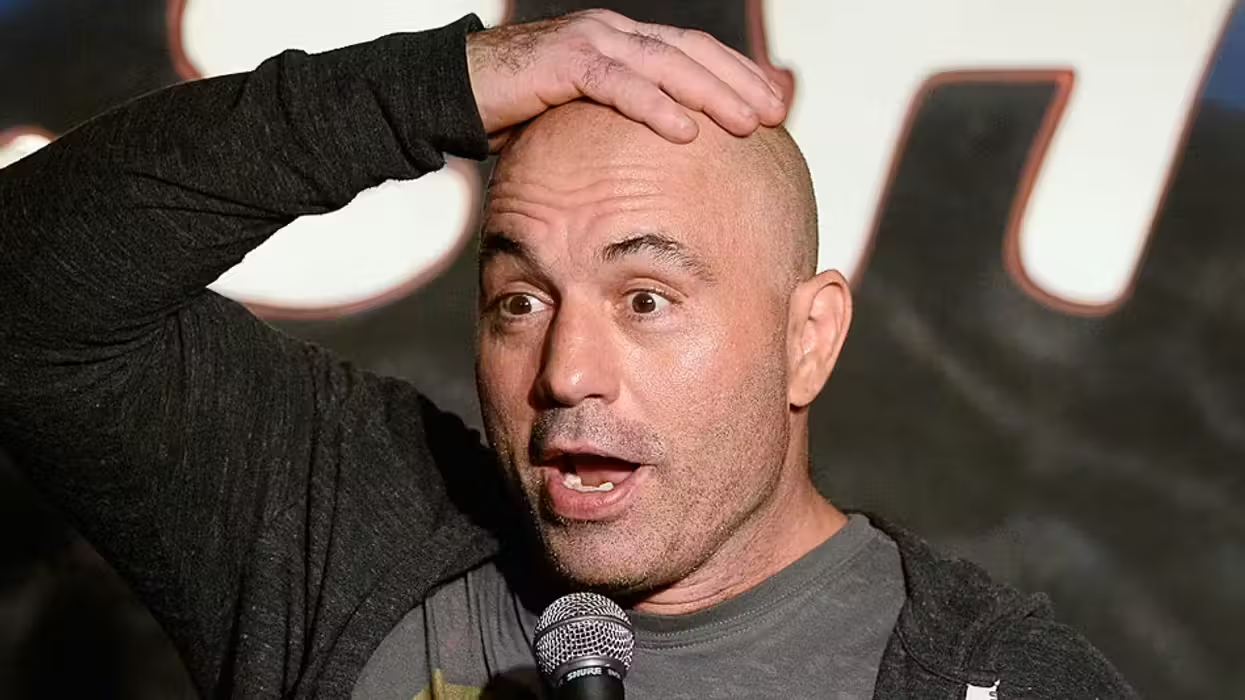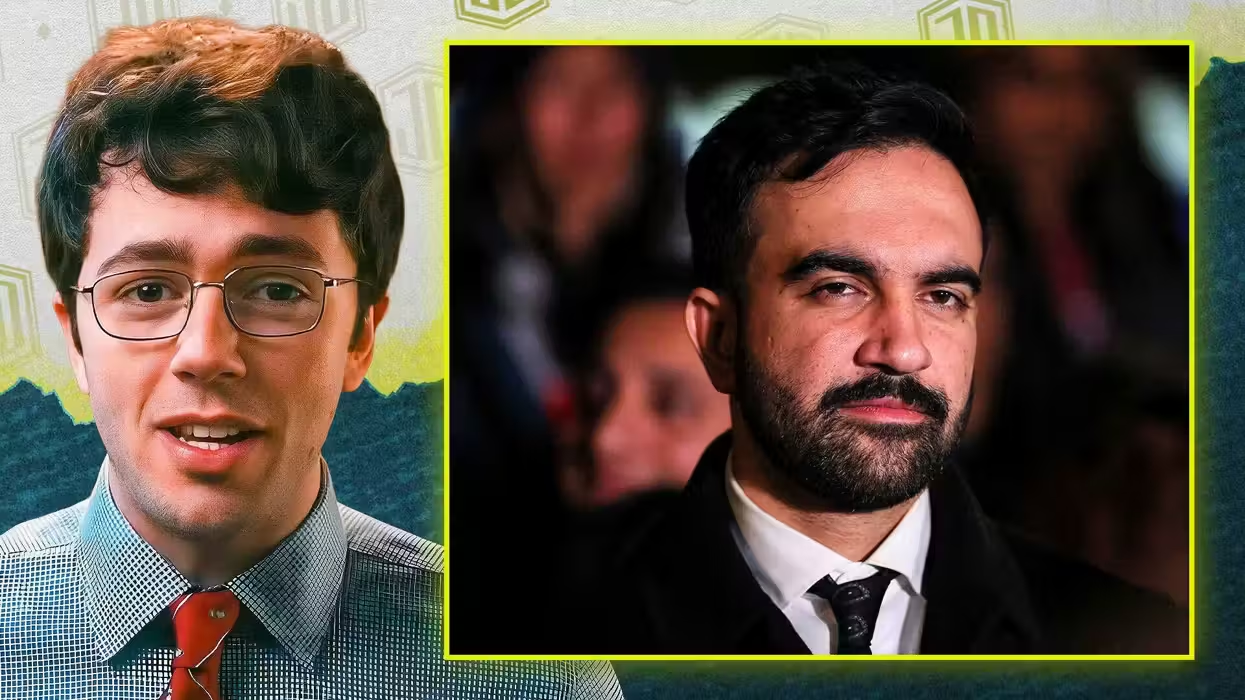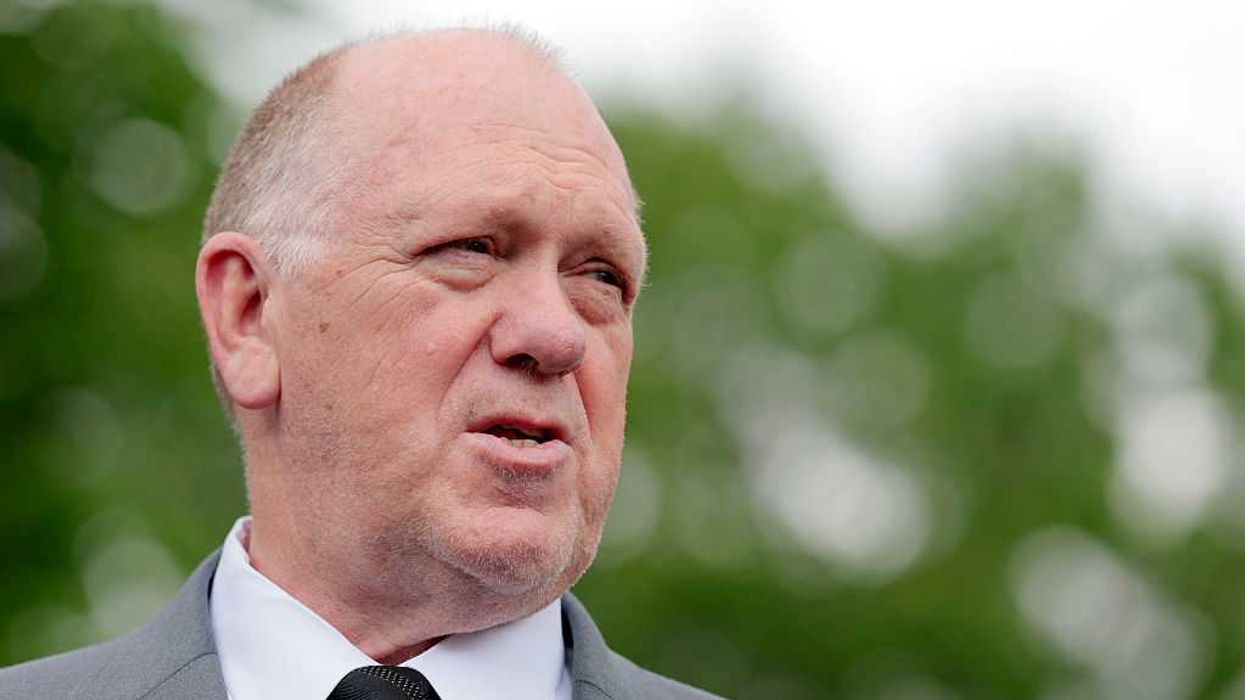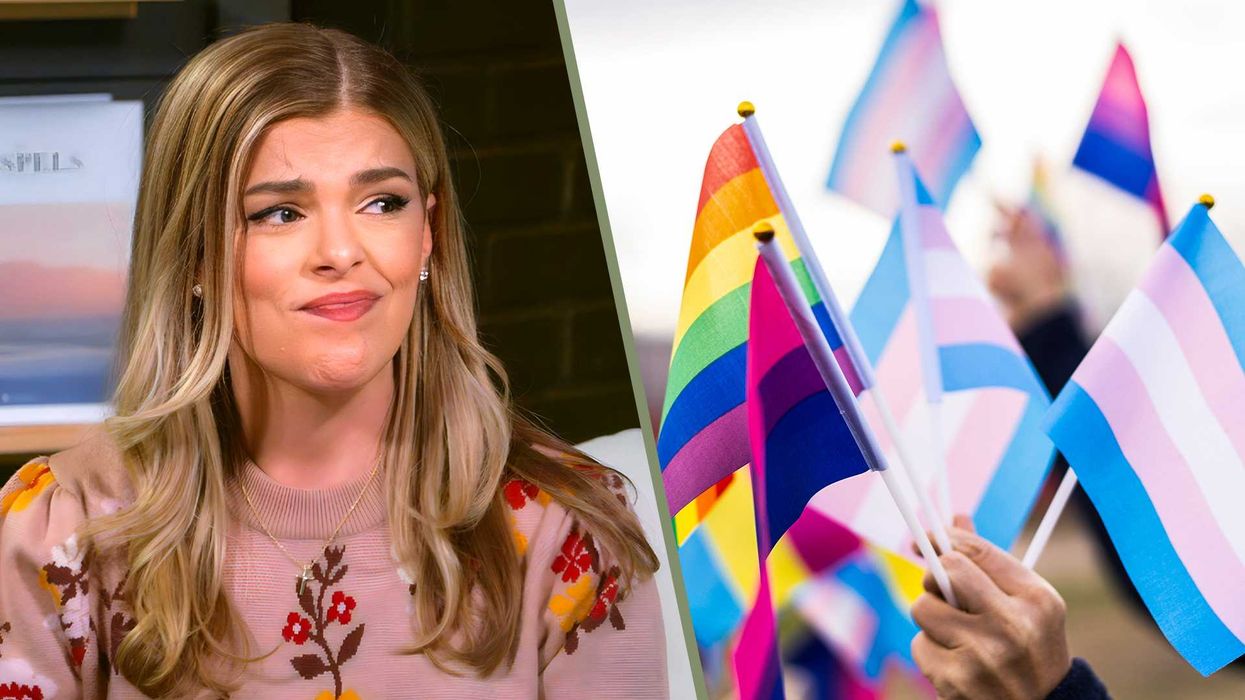
© 2025 Blaze Media LLC. All rights reserved.
Check out this Rabbi’s Very Funny Bible Study Videos Complete with Guitar-Jammin’ and Rockin’ Vocals
March 28, 2013
“A common misconception in the world is that being cool, funny and modern flows in direct contradiction with being religious and traditional.”
 Rabbi Benny Hershcovich tapes his humorous and inspiring weekly Torah video under a photo of Rabbi Menachem Mendel Schneerson, the Lubavitcher Rebbe, who said, “Today, we see how one person lighting a candle in his tiny corner can illuminate the entire world.” (Photo courtesy Hershcovich family)
Rabbi Benny Hershcovich tapes his humorous and inspiring weekly Torah video under a photo of Rabbi Menachem Mendel Schneerson, the Lubavitcher Rebbe, who said, “Today, we see how one person lighting a candle in his tiny corner can illuminate the entire world.” (Photo courtesy Hershcovich family)
If Sunday school ever left you feeling tired, well, sleep no more. After noticing he would tune out while watching online Bible commentaries, Rabbi Benzion “Benny” Hershcovich decided he’d try his hand at producing a different kind of video, one blending his love of Torah with his love of comedy. (And as you’ll soon see, he’s really funny).
Twenty-eight-year-old Hershcovich, his wife Sonia and their small children moved to Cabo San Lucas four years ago, hoping to spread faith, modesty and good deeds to the spring break town known more for debauchery, wet t-shirt contests and wild parties than for its spirituality.
As part of his responsibilities running the Cabo Jewish Center, Hershcovich would write a weekly e-mail to the small Jewish community including his thoughts on the weekly Torah portion (synagogues around the world read a portion of the Five Books of Moses each week, completing the full cycle every autumn). An estimated 400 Jews live permanently in Cabo.
Hershcovich tells TheBlaze that writing the newsletter was the hardest part of his job, which – after staring at the blank screen – could take four hours. So Hershcovich decided to start videotaping his message which he would then post on YouTube. Little did he realize, the thoughts intended for his small congregation would soon be noticed by others thousands of miles away, in the U.S., Canada, and even Israel.
Rabbi Benny – as he’s known to his congregants - prepared his first video in honor of the Jewish New Year last September. He says that later with the help of his brother, Zvi Hershcovich, who is both a rabbi and a screenwriter with “an incredible sense of humor” and “the brilliant input of my wife Sonia, [I] sort of created my little writing team.”
He shoots most of his fast-paced videos using the webcam on his computer (which he tells us just broke) and improvises lighting with a couple of clip lights perched on the various knickknacks in his home.
Not exactly the resources at Jon Stewart’s disposal, but with no less hilarious results.
In one video, “Problems Shmoblems,” Rabbi Benny describes the Israelites’ flight from slavery in Egypt. This week, Jews around the world celebrate Passover and the freedom from Pharaoh’s cruel grip.
The Book of Exodus describes how the Israelites thanked God in the “Song of the Sea.” Rabbi Benny put a modern twist on the song, with such irreverent but hilarious lyrics as: “We were scared and in a trance, I think I even wet my pants.”
He strums his guitar, belts out his terrific rocker’s voice and throws in some dramatic antics, almost reminiscent of Jack Black's rock music parodies.
“I’m an amateur guitar player. I know like six chords. I’m not a guitarist per se. I like sitting and jamming. I picked it up in Yeshiva, I never had formal lessons,” he tells TheBlaze.
He doesn’t let his dearth of video and editing equipment stop him from spreading his message. Though the product is humorous, Hershcovich’s greater goal in making the videos is serious, to inspire Jews and those of all faiths to be better people, to be a force for light in the world.
In “Don’t Lose Your Connection,” Hershcovich pretends to be broadcasting from his apocalypse, bomb-proof bunker. That is, until his wife calls him to “change the baby’s diaper.”
“They’re trying to lure us out,” he whispers to the camera.
The biblical text of Genesis describes how Jacob’s sons broke the news to their father that Joseph was still alive, even though for 22 years he believed his favored son had been ripped apart by wild beasts. Hershcovich rocks it out with these lyrics:
Daddy dear you've got to breathe, drink water, have a seat.The news we're gonna' tell you'll knock you off your tiny feet
Your cherished Joseph who you thought a wild animal tore
Ripped apart to pieces, blood and guts all on the floor
The gory scene it made you sad, you cried so many tears
You've gotten all depressed throughout the 22 whole years
Well I got news to tell you, it'll surely make you sing
But Joseph is alive and well. He's second to the king
In the video “Don’t Be a Loser,” Rabbi Benny recruits his brother Zvi, who asks Benny for a piece of his doughnut. Benny agrees to hand it over only if Zvi sells Benny his birthright. Sound familiar?
In another video, Rabbi Benny describes the animal sacrifices at the beginning of the Book of Leviticus, known in Hebrew as “Vayikra.” He dresses as a cult sacrifice worshiper looking creepy in a hoodie surrounded by eerie candles, baah’s like a sheep and forages for sweets like “Cookie Monster.”
Despite the humor, Hershcovich has a serious spiritual lesson to convey.
“Sacrifices. They seem so outdated and ancient. How on earth can we possibly relate to them? How can the Torah, which speaks so elaborately of the sacrifices in the Temple, have any relevance to our lives in the 21st century?” he asks.
He explains that the word in Hebrew for sacrifice, “korban,” means “getting close,” that is, the sacrifice was how people expressed their love and closeness to God.
“The sacrifice wasn’t some giant tailgate party,” he says. He describes Hassidic philosophy which teaches that we all have an animal within us with an insatiable appetite for life’s physical pleasures. Rabbi Benny says that sacrifice today means, “taking that selfish animal within us and filling it with a burning love for God, allowing it to be consumed in divinity and Godly pursuits.”
“We must sacrifice the selfish part of us,” he adds.
The Jewish “Peace Corps”
When the Montreal native and Sonia got married, they decided to become “shluchim,” that is, emissaries of the Chabad Lubavich movement. Rabbi Menachem Mendel Schneerson, the Lubavitcher Rebbe, inspired by President John F. Kennedy’s creation of the Peace Corps, encouraged young couples to reach Jews in the farthest corners of the globe by moving there themselves. Unlike the Peace Corps, the move is expected to be permanent, a lifetime commitment.
His wife, one of 17 siblings, grew up in Milan, Italy, because her parents are shluchim there.
As Rabbi Benny explains, “They’re going to live like in those countries, perhaps lower their living standards only to help somebody else...[and] help those Jews who need help who don’t have a warm home, a warm spiritual home, who don’t have any connection with their heritage…who don’t have the chance to see what Sabbath feels like and to know what thousands of years of their grandparents were giving up their lives for.”
The life can be intense. Because there are no Jewish day schools in Cabo, Benny’s wife homeschools their children. Because there is no kosher food, they run logistics to import the ingredients from the U.S. and Mexico City which Sonia then cooks for her family and tourists who want kosher meals. Sonia teaches Judaism to children from the community, while Benny stakes out the incoming cruise ships to spread the message of good deeds and Torah study to the visitors.
Rabbi Benny tells TheBlaze that “according to Hassidic philosophy, the very purpose of creation was in order for us to build God a home for him to dwell in in the lowly physical world. In essence, what this means is that the more coarse and physical the place, the greater is the need to pay attention and elevate the area.”
“We here in Cabo definitely have our work cut out for us, and we will continue to provide a wellspring of real truth for everyone, even in these lowly places,” he adds.
 Rabbi Benny Hershcovich tapes his weekly video message from Cabo San Lucas, Mexico using improvised props and lighting (Photo courtesy: Hershcovich family)
Rabbi Benny Hershcovich tapes his weekly video message from Cabo San Lucas, Mexico using improvised props and lighting (Photo courtesy: Hershcovich family)
Despite the spiritually empty content of many of the channel’s offerings, Rabbi Benny believes YouTube can be a force for good. “It’s a new and exciting way of making videos and getting out there. It keeps people intrigued and entertained…We’ve got to make Torah exciting,” he says.
“This is an amazing channel to bring something of value to people, to bring a higher purpose to people, to bring goodness that will benefit people’s lives,” he adds.
According to Rabbi Simon Jacobson’s book, “Toward a Meaningful Life: The Wisdom of the Rebbe,” Rabbi Schneerson “would strongly encourage the use of modern communications to unite mankind, uniting people who are otherwise divided by space and time.”
“One might think, What can I possibly accomplish sitting in this tiny corner on this huge planet of billions of people?” the Rebbe said. “Today, we see how one person lighting a candle in his tiny corner can illuminate the entire world.”
That’s a thought Rabbi Benny’s mom echoes. He says, “My mother is pushing me, “If you don’t do this for everyone, it’s terrible, the world is counting on you to do it, you can’t just stick to your community.”
TheBlaze spoke further with Rabbi Benny to learn more about his work and inspirations. Here is an excerpt from our conversation:
What inspired you to start making your Bible study videos?
It was a blend of trying to be Rabbi and teach Torah to others, while keeping things contemporary, short and most importantly, entertaining.
A common misconception in the world is that being cool, funny and modern flows in direct contradiction with being religious and traditional. The religious people seem to always be perceived as very serious about life. I cannot answer to the various sects within Judaism, but I do know that within my own sect - Chabad - we were always taught to embrace life around us, not reject it, channeling the opportunities that are given to this world to holiness and in a positive, loving way.
The videos were born when I started coming across popular video channels on YouTube pulling in hundreds of thousands, if not millions of viewers per show. These videos were usually empty opinion videos by energetic guys, giving their thoughts on politics, fashion, Hollywood and dating advice. The style was fast paced and because of it, they were garnering millions of fans. I figured that someone must have done the same style to meaningful, Kosher videos, which can enhance and inspire those viewers in the same quick paced style. Yet, after searching high and lo on YouTube I could not find a single such video. So I decided that if nobody else was doing it, then I would give it a shot.
What feedback have you received so far?
Only positive feedback, as well as lots of constructive criticism (or at least I like to look at it like that) and one extremist YouTube comment that claimed that I was a baby killer who should be banned from our planet for being a Jew. Constructive criticism? You decide.
What message in your videos do you think those without a background in Judaism can appreciate?
When I make my videos, I specifically design them to be as universal as possible. Our job as the Jewish nation is in no way to lock ourselves in the ghetto of religion and holiness. We are supposed to be a light unto the nations, which means that we need to shine and allow all of humanity to be inspired and better their own lives.
I try to keep the Jewish flavor to the videos: gefilte fish, kvetching, [complaining], Jewish mothers and lawyer jokes. But other than that, I believe that the messages are purely universal and apply to everyone equally.
I try to keep the messages very practical and “21st century'ish,” tearing down the stereotypes that believe the Torah to be an old fashioned, irrelevant book of antiquities.
Did you always know you were going to be a rabbi? (Or did you consider a career in comedy?)
Simply, I always knew I was going to be a rabbi. I didn't have much other choice! Here's why:
I grew up in a shoebox. We were a closed, old-fashioned Orthodox community in Montreal, Canada. My parents sent me to the community private Yeshiva where, although secular studies were available, they were optional. My parents decided that I would study Torah all day and my Math, Science, English, French, History and all other subjects would be from homeschooling. That's exactly what happened. Well alright, not exactly. I never got around to studying Math, History, Science or French. I did learn to read and write English at the age of 6 though. This is why being a rabbi was in a certain way locked into my destiny.
In school, we made trouble like everyone else and there was a time when I wanted to be a hockey player. I always wondered what I would do with keeping the Sabbath while playing in the NHL... If Sabbath ends at 5:30pm on Saturday, would I be able to quickly do the evening [prayer] service and rush over to the packed arena to gear up and play the 7:30pm game on Saturday? Would my team allow me to do that? What time do the players even go to the rink on game day? I always wondered these things. […]
We never had a television in our home, universal movies were forbidden and we never had magazines at home, but we were still passionately taught that in essence, these things were not evil to be shunned. Rather, they were very important novel ways for us to channel goodness into the world. In other words, instead of using television and movies to promote drugs, violence and immodesty, we should make movies and television shows which promote being holy and divine. Instead of magazines screaming the latest scandals and gossip that literally destroy lives and do not better the reader's life in any way, we should use the medium of magazines to promote goodness, kindness and living a better life, both physically and spiritually.
In that sense, although I knew I was going to be a rabbi (like I mentioned before, I didn't have too many options), I also knew that being a rabbi doesn't mean conforming to what rabbis have been like for the past thousands of years, rather, it meant channeling the God given talents that I have to best fulfill the purpose of my existence, as a rabbi, and also as a human being.
What brought you to Mexico?
I always get asked this question. The classic answer is "Jews! Who else?” As Chabad Hassidim, we were taught by our Grand Rebbe, Rabbi Menachem Mendel Schneerson of blessed memory, that when a fire burns and someone is in danger, then irrelevant of how qualified one is to be a fireman, if there is nobody else around, he has the obligation to enter into the burning building and save one single life, how much more so if there are numerous people in danger.
Well, the Rebbe taught that in our post-Holocaust era, the world around us is burning spiritually. Jewish people the world over are unfortunately losing touch with their heritage at an alarming rate. These spiritual fires are raging because of a lack of education in the value of our traditions and our Torah.
He instilled in each of his followers a passion to follow his dream of perfecting this world one tiny soul at a time. He sent emissaries throughout the world to fulfill this dream of his, reigniting the Jewish spark within every single Jewish person around the world. Of course this mission was not only geared to Jews. The Rebbe was a proud advocate of spreading the Seven Noahide Laws to all of humanity. When the Jews and non-Jews walk together in serving God as He has commanded each of us, then we are on the road to living in a better, more civilized and peaceful world.
Want to leave a tip?
We answer to you. Help keep our content free of advertisers and big tech censorship by leaving a tip today.
Want to join the conversation?
Already a subscriber?
more stories
Sign up for the Blaze newsletter
By signing up, you agree to our Privacy Policy and Terms of Use, and agree to receive content that may sometimes include advertisements. You may opt out at any time.
Related Content
© 2025 Blaze Media LLC. All rights reserved.
Get the stories that matter most delivered directly to your inbox.
By signing up, you agree to our Privacy Policy and Terms of Use, and agree to receive content that may sometimes include advertisements. You may opt out at any time.






